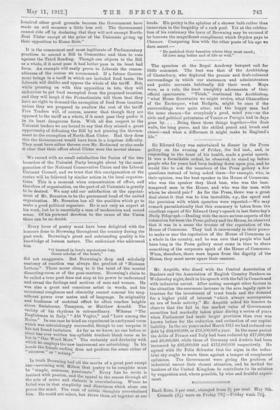Every lover of poetry must have been delighted with the
honours done to Browning throughout the country during the past week. Browning's great and outstanding quality is his knowledge of human nature. The enthusiast who addressed him "0 learned in love's mysterious low, Great scholar of the heart," did not exaggerate. But Browning's deep and scholarly anatomy of emotion was always the product of "Humane Letters." There never clung to it the taint of the mental dissecting-room or of the post-mortem. Browning's claim to • be called a true poet does not stop at his power to understand and reveal the feelings and motives of men and women. He was also a great and conscious artist in words, and his occasional roughness and obscurity cannot conceal his mag- nificent' power over metre and of language. In originality and freshness of metrical effect he often reaches heights above Swinburne, Tennyson, or Matthew Arnold. The variety of his rhythms is extraordinary. Witness " The Englishman in " Abt Vogler," and " Love among the Ruins." In one ease he tried an experiment in unrhymed verse which was astonishingly successful, though to our surprise it has not found imitators. As far as we know, no one before or since has over written ten-syllable trochaic blank verse as he has " One Word More." The certainty and dexterity with which he employs the new instrument are astonishing. In his hands the female ending does not produce the sense either of "niceness " or " satiety."










































 Previous page
Previous page